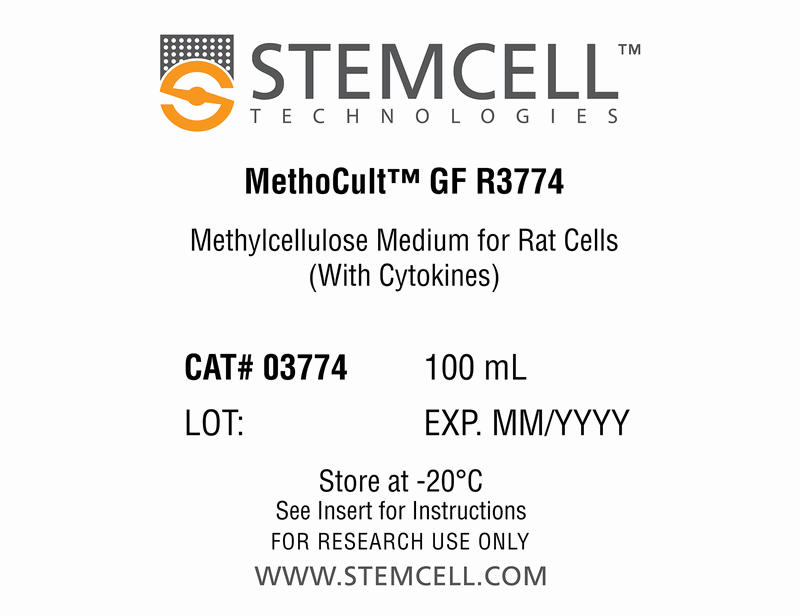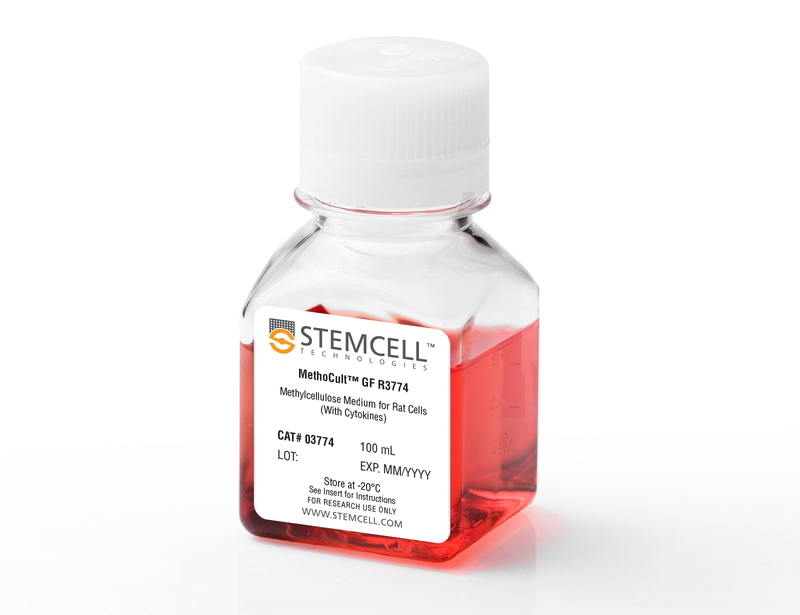MethoCult™ GF R3774
Methylcellulose-based medium with recombinant cytokines (without erythropoietin [EPO]) for rat cells
概要
MethoCult™ GF R3774 is optimized for growth and enumeration of granulocyte-macrophage progenitor cells (CFU-GM, CFU-G and CFU-M) in colony-forming unit (CFU) assays of rat bone marrow cells.
Browse our Frequently Asked Questions (FAQs) on performing the CFU assay.
Browse our Frequently Asked Questions (FAQs) on performing the CFU assay.
Contains
• Methylcellulose in Iscove's MDM
• Fetal bovine serum
• Bovine serum albumin
• 2-Mercaptoethanol
• Stem cell factor (SCF)
• Interleukin 3 (IL-3)
• Granulocyte-macrophage colony-stimulating factor (GM-CSF)
• Supplements
• Fetal bovine serum
• Bovine serum albumin
• 2-Mercaptoethanol
• Stem cell factor (SCF)
• Interleukin 3 (IL-3)
• Granulocyte-macrophage colony-stimulating factor (GM-CSF)
• Supplements
Subtype
Semi-Solid Media, Specialized Media
Cell Type
Hematopoietic Stem and Progenitor Cells
Species
Rat
Application
Cell Culture, Colony Assay, Functional Assay
Brand
MethoCult
Area of Interest
Drug Discovery and Toxicity Testing, Stem Cell Biology
技术资料
| Document Type | 产品名称 | Catalog # | Lot # | 语言 |
|---|---|---|---|---|
| Product Information Sheet | MethoCult™ GF R3774 | 03774 | All | English |
| Safety Data Sheet | MethoCult™ GF R3774 | 03774 | All | English |
数据及文献
Publications (1)
The Journal of burn care & rehabilitation
Changes in bone marrow-derived myeloid cells from thermally injured rats reflect changes in the progenitor cell population.
Abstract
Abstract
Bone marrow progenitor cells develop into mature tissue myeloid cells under the influence of colony-stimulating factors. Cytokines that are elevated post-thermal injury have been shown to influence this process. We hypothesize that thermal injury alters myelopoiesis at the level of the progenitor cell. These differences should be visible after in vitro cultures that include colony-stimulating factors. Prior to culture, bone marrow at postburn day 1 (PBD1) was assessed for cell surface markers and the levels of myeloid progenitors. After culture in granulocyte/macrophage-stimulating colony-stimulating factor, the cell surface markers of the cultured cells were determined. PBD1 marrow from thermally injured rats had more progenitor cells responsive to granulocyte/macrophage-stimulating colony-stimulating factor than did sham. Cultured PBD1 marrow produced more CD90(br) MY(br) CD45(dim) CD4(-) MHCII(-) CD11b(dim) eosinophils than did sham. Cultured bone marrow from thermally injured animals produces myeloid cells with an altered phenotype. Similar changes in myelopoiesis may take place in vivo.


